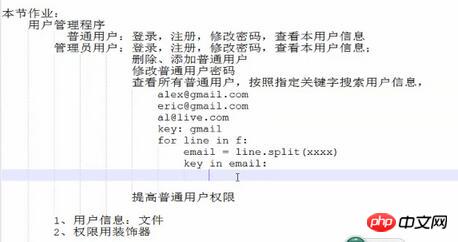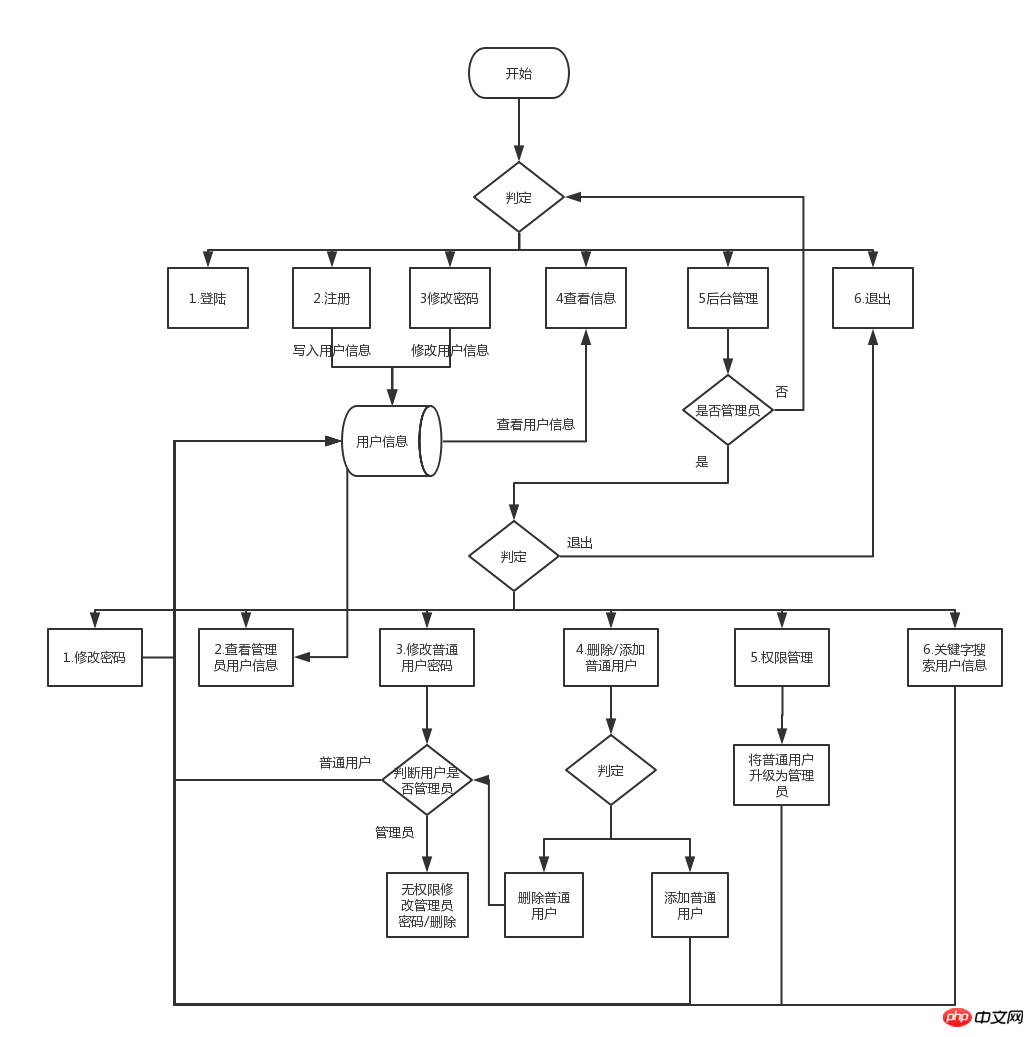Simply make a python background management program
This article mainly introduces the implementation method of a simple python background management program in detail, which has certain reference value. Interested friends can refer to it
1. Job requirements


## 2. Flow chart

3. Source code and specific ideas
import shutil
import os
import sys
USER_LOGIN = {'is_login': False}
def outer(func): #装饰器,若没有登陆则输出“请登陆”
def inner(*args, **kwargs):
if USER_LOGIN['is_login']:
r = func(*args, **kwargs)
return r
else:
print("请登陆")
return inner
def outer1(func): #装饰器,若不是管理员则输出“权限不足”
def inner1(*args, **kwargs):
if USER_LOGIN['user_type'] == '2':
r = func(*args, **kwargs)
return r
else:
print("不是管理员,权限不足")
return inner1
@outer
def change_pwd(changed_user, changed_pwd, type_user): #修改密码
if type_user == '1':
print("欢迎%s修改密码".center(50, '-') % USER_LOGIN['current_user'])
with open('regist', 'r', encoding='utf-8') as f1, open('regist_new', 'w', encoding='utf-8') as f2:
for line in f1:
read_list = line.strip().split('|')
if read_list[0] == changed_user:
read_list[1] = changed_pwd
f2.write('|'.join(read_list) + '\n')
continue
f2.write(line)
shutil.move('regist', 'regist_bak') #把regist文件复制到regist_bak文件中去
os.rename('regist_new', 'regist') #再将regist_new改名为regist 妙妙妙!
else:
print("没有权限修改管理员密码")
@outer
def look_information(): #查看本用户信息
print("欢迎%s查看信息".center(50, '-') % USER_LOGIN['current_user'])
with open('regist', 'r+', encoding='utf-8') as f:
for line in f:
read_list = line.strip().split('|')
if read_list[0] == USER_LOGIN['current_user']:
print("用户名:%s" % read_list[0])
print("密码:%s" % read_list[1])
print("邮箱:%s" % read_list[2])
print("电话:%s" % read_list[3])
def login(user, pwd): #登陆
with open('regist', 'r+', encoding='utf-8') as f:
for line in f:
read_list = line.strip().split('|')
if read_list[0] == user and read_list[1] == pwd: #若用户存在
USER_LOGIN['is_login'] = True
USER_LOGIN['current_user'] = user
USER_LOGIN['user_type'] = read_list[-1]
print("欢迎%s登陆".center(50, '-') % USER_LOGIN['current_user'])
break
if not USER_LOGIN['is_login']: #若用户还没注册
print("用户不存在,请注册")
def register(reg_user, reg_pwd, reg_email, reg_phone): #注册
register_list = []
register_list.append(reg_user) #将用户信息加入列表
register_list.append(reg_pwd)
register_list.append(reg_email)
register_list.append(reg_phone)
register_list.append('1')
with open('regist', 'a', encoding='utf-8') as f: #将用户信息写入文件
li = '|'.join(register_list)
f.write(li + '\n')
print("注册/添加信息:", li)
def delete_func(dele_user, type_user): #删除普通用户
if type_user == '1': #若删除的是普通用户
exit_flag = False
with open('regist', 'r+', encoding='utf-8') as f1, open('regist_new', 'w', encoding='utf-8') as f2:
for line in f1:
ret_list = line.strip().split('|')
if ret_list[0] == dele_user:
exit_flag = True #标志位原本设为False,当找到相应用户删除后,标志位设为True
print("普通用户删除成功")
continue
f2.write(line)
shutil.move('regist', 'regist_bak')
os.rename('regist_new', 'regist')
if not exit_flag:
print("要删除普通用户不存在")
elif type_user == '2': #若删除的是管理员用户
print("没有权限删除管理员帐号")
def upper_level(upper_user): #升级为管理员
with open('regist', 'r+', encoding='utf-8') as f1, open('regist_new', 'w', encoding='utf-8') as f2:
for line in f1:
li = line.strip().split('|')
if li[0] == upper_user:
li[-1] = '2'
print("%s已成为管理员" % upper_user)
f2.write('|'.join(li) + '\n')
continue
f2.write(line)
shutil.move('regist', 'regist_bak')
os.rename('regist_new', 'regist')
def search(search_info): #简单搜索
with open('regist', 'r+', encoding='utf-8') as f:
for line in f:
ret_list = line.strip().split('|')
if search_info in ret_list:
print(ret_list)
def get_usertype(user): #通地用户名获得用户类型,返回1或2
with open('regist', 'r+', encoding='utf-8') as f:
for line in f:
li = line.strip().split('|')
if li[0] == user:
return li[-1] #返回帐号的类型 1或2
@outer1
def admin_user(): #管理员调用
num = input("请选择:1.修改密码;2.查看本用户信息;3.修改普通用户密码;"
"4.删除/添加普通用户;5.权限管理;6.关键字搜索普通用户信息;7.退出:")
if num == '1':
new_pwd = input("请输入新的密码:")
change_pwd(new_pwd)
elif num == '2':
look_information()
elif num == '3':
user_changed = input("请输入修改密码的用户名:")
type_user = get_usertype(user_changed)
new_pwd = input("请输入新的密码:")
change_pwd(user_changed, new_pwd, type_user)
elif num == '4':
add_or_dele = input("1.删除普通用户;2.添加普通用户")
if add_or_dele == '1':
delete_username = input("请输入要删除普通用户的用户名:")
type_user = get_usertype(delete_username)
delete_func(delete_username, type_user)
elif add_or_dele == '2':
regi_username = input("请输入注册用户名:")
regi_pwd = input("请输入注册密码:")
regi_email = input("请输入邮箱:")
regi_phone = input("请输入电话:")
register(regi_username, regi_pwd, regi_email, regi_phone)
elif num == '5':
upper_user = input("请输入升级为管理员的普通用户名:")
upper_level(upper_user)
elif num == '6':
search_information = input("请输入要查找的关键字:")
search(search_information)
elif num == '7':
sys.exit()
def main():
while True:
choice = input("请选择:1.登陆;2.注册;3.修改密码;4.查看信息;5.后台管理;6.退出:")
if choice == '1':
username = input("请输入用名名:")
password = input("请输入密码:")
login(username, password)
elif choice == '2':
regi_username = input("请输入注册用户名:")
regi_pwd = input("请输入注册密码:")
regi_email = input("请输入邮箱:")
regi_phone = input("请输入电话:")
register(regi_username, regi_pwd,regi_email,regi_phone)
print("注册成功".center(50, '*'))
elif choice == '3':
new_pwd = input("请输入新的密码:")
current_user = USER_LOGIN['current_user']
change_pwd(current_user, new_pwd)
print("修改密码成功,请重新登陆".center(50, '-'))
sys.exit()
elif choice == '4':
look_information()
elif choice == '5':
admin_user()
elif choice == '6':
sys.exit()
main()@outer1
def admin_user(): #管理员调用
num = input("请选择:1.修改密码;2.查看本用户信息;3.修改普通用户密码;"
"4.删除/添加普通用户;5.权限管理;6.关键字搜索普通用户信息;7.退出:")
if num == '1':
new_pwd = input("请输入新的密码:")
change_pwd(new_pwd)
elif num == '2':
look_information()
elif num == '3':
user_changed = input("请输入修改密码的用户名:")
type_user = get_usertype(user_changed)
new_pwd = input("请输入新的密码:")
change_pwd(user_changed, new_pwd, type_user)
elif num == '4':
add_or_dele = input("1.删除普通用户;2.添加普通用户")
if add_or_dele == '1':
delete_username = input("请输入要删除普通用户的用户名:")
type_user = get_usertype(delete_username)
delete_func(delete_username, type_user)
elif add_or_dele == '2':
regi_username = input("请输入注册用户名:")
regi_pwd = input("请输入注册密码:")
regi_email = input("请输入邮箱:")
regi_phone = input("请输入电话:")
register(regi_username, regi_pwd, regi_email, regi_phone)
elif num == '5':
upper_user = input("请输入升级为管理员的普通用户名:")
upper_level(upper_user)
elif num == '6':
search_information = input("请输入要查找的关键字:")
search(search_information)
elif num == '7':
sys.exit()
def main():
while True:
choice = input("请选择:1.登陆;2.注册;3.修改密码;4.查看信息;5.后台管理;6.退出:")
if choice == '1':
username = input("请输入用名名:")
password = input("请输入密码:")
login(username, password)
elif choice == '2':
regi_username = input("请输入注册用户名:")
regi_pwd = input("请输入注册密码:")
regi_email = input("请输入邮箱:")
regi_phone = input("请输入电话:")
register(regi_username, regi_pwd,regi_email,regi_phone)
print("注册成功".center(50, '*'))
elif choice == '3':
new_pwd = input("请输入新的密码:")
current_user = USER_LOGIN['current_user']
change_pwd(current_user, new_pwd)
print("修改密码成功,请重新登陆".center(50, '-'))
sys.exit()
elif choice == '4':
look_information()
elif choice == '5':
admin_user()
elif choice == '6':
sys.exit()
main()4. Summary of pitfalls
1. How to change the password? I was confused at that time. Because if you use f.write(xx), it will be written directly at the end of the file. So I thought, okay, just write it at the end. But if the record of the changed password is added to the last line, how can I delete the original one? One more problem.shutil.move('regist', 'regist_bak') #把regist文件复制到regist_bak文件中去 os.rename('regist_new', 'regist') #再将regist_new改名为regist 妙妙妙!
new_str = line.replace(read_list[1], changed_pwd) I used it at first, but later there was a BUG!
For example:
When the username and password are the same, when the password is changed, the password is also changed. Not only that, using the replace() method, the user name etc. also appear to be modified when changing user_type. At that time I was in trouble again. This unscientific!
Later I looked carefully at the source code of
replace() and found out that I was wrong. You can also look at the Python replace() method
found that I abused global variables
USER_LOGIN['user_type'] = '1' register_list.append(USER_LOGIN['user_type'])
The above is the detailed content of Simply make a python background management program. For more information, please follow other related articles on the PHP Chinese website!

Hot AI Tools

Undresser.AI Undress
AI-powered app for creating realistic nude photos

AI Clothes Remover
Online AI tool for removing clothes from photos.

Undress AI Tool
Undress images for free

Clothoff.io
AI clothes remover

AI Hentai Generator
Generate AI Hentai for free.

Hot Article

Hot Tools

Notepad++7.3.1
Easy-to-use and free code editor

SublimeText3 Chinese version
Chinese version, very easy to use

Zend Studio 13.0.1
Powerful PHP integrated development environment

Dreamweaver CS6
Visual web development tools

SublimeText3 Mac version
God-level code editing software (SublimeText3)

Hot Topics
 How to solve the permissions problem encountered when viewing Python version in Linux terminal?
Apr 01, 2025 pm 05:09 PM
How to solve the permissions problem encountered when viewing Python version in Linux terminal?
Apr 01, 2025 pm 05:09 PM
Solution to permission issues when viewing Python version in Linux terminal When you try to view Python version in Linux terminal, enter python...
 How to efficiently copy the entire column of one DataFrame into another DataFrame with different structures in Python?
Apr 01, 2025 pm 11:15 PM
How to efficiently copy the entire column of one DataFrame into another DataFrame with different structures in Python?
Apr 01, 2025 pm 11:15 PM
When using Python's pandas library, how to copy whole columns between two DataFrames with different structures is a common problem. Suppose we have two Dats...
 Python hourglass graph drawing: How to avoid variable undefined errors?
Apr 01, 2025 pm 06:27 PM
Python hourglass graph drawing: How to avoid variable undefined errors?
Apr 01, 2025 pm 06:27 PM
Getting started with Python: Hourglass Graphic Drawing and Input Verification This article will solve the variable definition problem encountered by a Python novice in the hourglass Graphic Drawing Program. Code...
 Python Cross-platform Desktop Application Development: Which GUI Library is the best for you?
Apr 01, 2025 pm 05:24 PM
Python Cross-platform Desktop Application Development: Which GUI Library is the best for you?
Apr 01, 2025 pm 05:24 PM
Choice of Python Cross-platform desktop application development library Many Python developers want to develop desktop applications that can run on both Windows and Linux systems...
 Do Google and AWS provide public PyPI image sources?
Apr 01, 2025 pm 05:15 PM
Do Google and AWS provide public PyPI image sources?
Apr 01, 2025 pm 05:15 PM
Many developers rely on PyPI (PythonPackageIndex)...
 How to efficiently count and sort large product data sets in Python?
Apr 01, 2025 pm 08:03 PM
How to efficiently count and sort large product data sets in Python?
Apr 01, 2025 pm 08:03 PM
Data Conversion and Statistics: Efficient Processing of Large Data Sets This article will introduce in detail how to convert a data list containing product information to another containing...
 How to optimize processing of high-resolution images in Python to find precise white circular areas?
Apr 01, 2025 pm 06:12 PM
How to optimize processing of high-resolution images in Python to find precise white circular areas?
Apr 01, 2025 pm 06:12 PM
How to handle high resolution images in Python to find white areas? Processing a high-resolution picture of 9000x7000 pixels, how to accurately find two of the picture...
 How to solve the problem of file name encoding when connecting to FTP server in Python?
Apr 01, 2025 pm 06:21 PM
How to solve the problem of file name encoding when connecting to FTP server in Python?
Apr 01, 2025 pm 06:21 PM
When using Python to connect to an FTP server, you may encounter encoding problems when obtaining files in the specified directory and downloading them, especially text on the FTP server...






